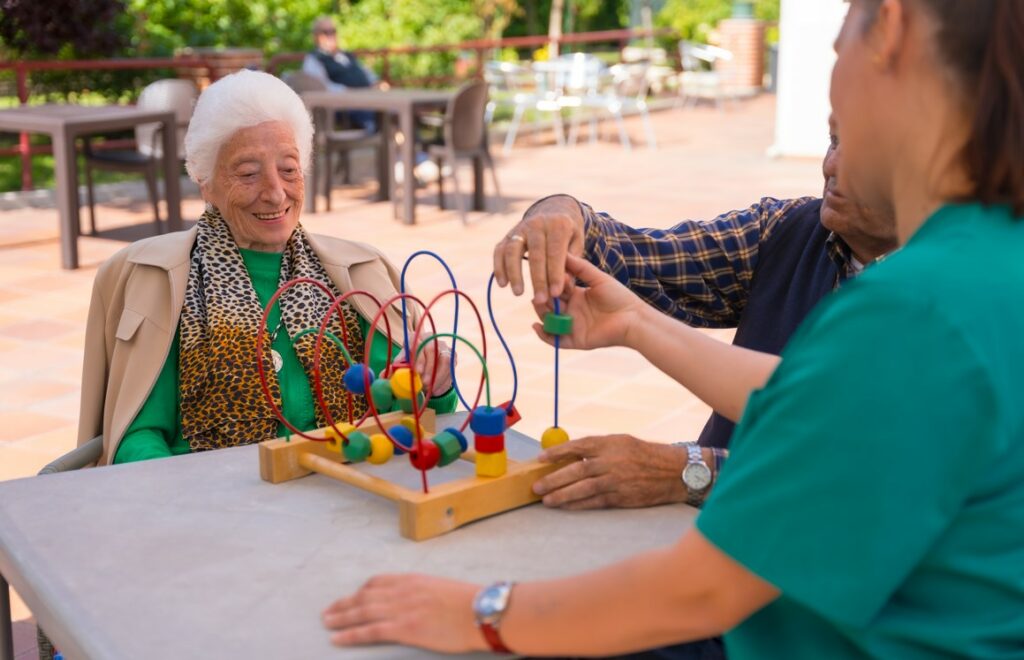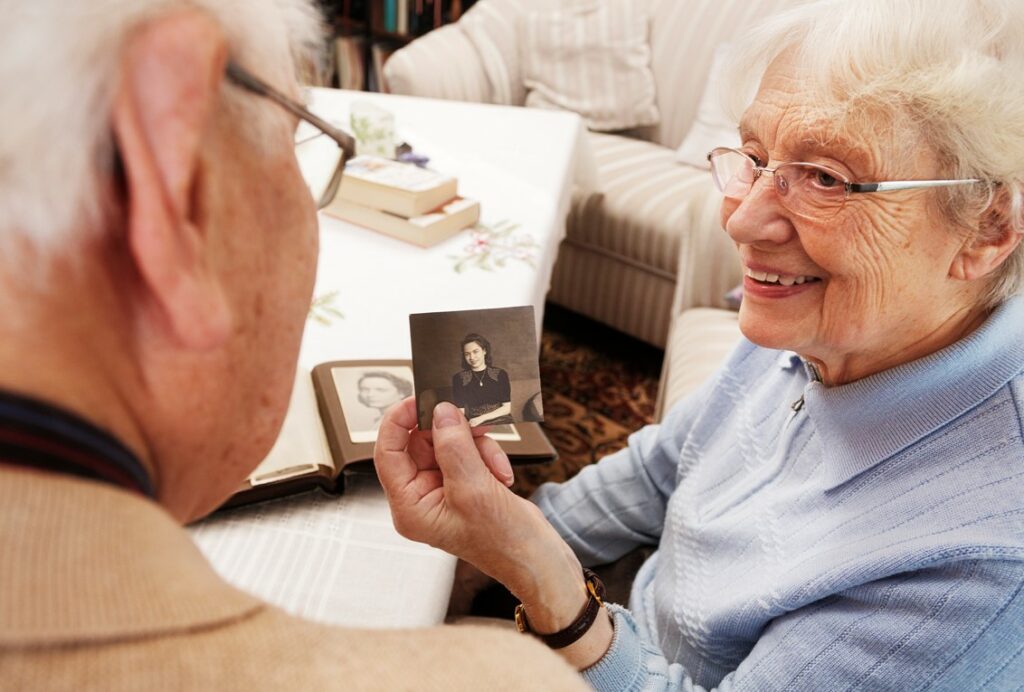Considering memory care for a loved one is crucial due to the specialized needs associated with cognitive decline and dementia-related conditions. Here are several reasons highlighting the importance:
- Expertise and Specialized Care: Memory care facilities are specifically designed to cater to individuals with memory-related issues. Staff members are often trained in dementia care, ensuring they possess the expertise to address the unique challenges that arise.
- Safety and Security: Individuals with cognitive decline are prone to wandering and may struggle with recognizing potential dangers. Memory care facilities are designed with enhanced safety features and secure environments to minimize risks and provide a reassuring setting for residents.
- Structured Routine and Programs: Consistent routines and specialized programs are essential for individuals with memory issues. Memory care facilities typically offer structured daily activities and therapies tailored to support cognitive function and emotional well-being.
- Professional Monitoring and Healthcare: Continuous monitoring by trained professionals is crucial for managing the progression of memory-related conditions. Memory care facilities often have healthcare staff available around the clock, ensuring prompt response to medical needs and adjustments in care plans as necessary.
- Emotional and Social Support: Cognitive decline can lead to isolation and emotional distress. Memory care facilities often focus on creating a supportive and social environment where residents can interact, reducing feelings of loneliness and fostering a sense of community.
- Adapted Living Spaces: Memory care facilities are designed with layouts that accommodate the specific needs of individuals with memory issues. This can include easy navigation, visual cues, and comfortable spaces that promote a sense of familiarity and reduce confusion.
- Respite for Family Caregivers: Caring for a loved one with cognitive decline can be emotionally and physically demanding. Memory care facilities provide respite for family caregivers, allowing them to maintain their own well-being while ensuring their loved one receives the specialized care they require.
In summary, memory care is important as it addresses the unique challenges posed by cognitive decline, offering a safe, supportive, and specialized environment that enhances the overall quality of life for individuals with memory-related conditions.

Is Memory Care the Right Fit for Your Loved One's Unique Needs?
Exploring whether memory care is the right fit for your loved one involves considering various factors related to their unique needs and the challenges associated with cognitive decline. Here’s a comprehensive exploration, along with examples and practical tips to guide your decision-making process:
Understanding Your Loved One’s Unique Needs
Assessing Cognitive Challenges:
Example: If your loved one is experiencing memory loss, confusion, or difficulties with daily tasks, it may be an indication that memory care, with its specialized focus on cognitive issues, could be beneficial.
Behavioral Changes:
Example: Uncharacteristic behaviors such as wandering, aggression, or social withdrawal may suggest the need for a care environment equipped to handle the emotional and behavioral aspects of dementia.
Signs Memory Care Could Be Beneficial
Safety Concerns:
Example: If your loved one frequently gets disoriented or has trouble navigating familiar spaces, a memory care facility with enhanced safety features, such as secure entrances and exits, can provide peace of mind.
Specialized Care Requirements:
Example: If your loved one requires medication management, assistance with personal care, or needs a structured routine, memory care professionals are trained to provide the specialized care necessary.
Tips for Evaluating Memory Care Facilities
Staff Training and Expertise:
Tip: Inquire about the training and qualifications of the staff. Ensure they have expertise in dementia care and are equipped to handle the unique challenges associated with cognitive decline.
Observation of Resident Engagement:
Tip: During visits, observe how residents are engaged in activities. A well-rounded memory care program should include activities that stimulate cognitive function and provide opportunities for social interaction.
Benefits of Memory Care
Enhanced Quality of Life:
Example: Memory care facilities often offer tailored activities and therapies designed to enhance residents’ overall quality of life, fostering a sense of purpose and joy.
Emotional Support for Families:
Example: Family caregivers may find relief in knowing that their loved one is in a supportive environment, allowing them to focus on maintaining their own well-being.
Considerations for Transitioning to Memory Care
Gradual Transition:
Tip: Some facilities offer short-term respite stays, allowing your loved one to become familiar with the environment gradually. This can make the transition smoother.
Communication with Staff:
Tip: Establish open communication with the memory care staff. Regular updates on your loved one’s well-being can provide reassurance and build a collaborative relationship.
To gain further clarity on whether memory care is the right fit for your loved one, we invite you to take our Memory Care Quiz below. These carefully crafted questions aim to guide you through the signs that may indicate the need for specialized care. Additionally, for a more in-depth understanding, you can download our comprehensive information whitepaper by checking off the box at the bottom. Your informed decision is a crucial step toward ensuring the well-being and quality of life for your loved one in their unique journey.

How Do Specialized Activities Unlock Joy in Memory Care?
Delving into the positive facets of Memory Care, this exploration centers on the significance of specialized programs and activities. It aims to illuminate the profound impact these tailored engagements have on the emotional well-being and overall enjoyment of individuals navigating the challenges of cognitive decline.
- Tailored Engagement for Cognitive Stimulation:
Specialized activities in Memory Care are crafted to stimulate cognitive functions. Whether it’s reminiscence therapy, brain games, or creative arts, these engagements are designed to maintain mental acuity, fostering a sense of accomplishment and joy.
- Promoting Social Interaction:
Activities serve as a medium for socialization among residents. Group activities, outings, and communal events create an environment where individuals can connect, share experiences, and form meaningful bonds, contributing to a sense of joy derived from social engagement.
- Individualized Approaches to Preferences:
Memory Care programs often recognize the unique preferences of residents. Tailoring activities based on individual interests ensures a personalized experience, allowing residents to engage in pursuits that bring them joy and a sense of fulfillment.
- Emotional Expression and Well-being:
Engaging in specialized activities provides residents with avenues for emotional expression. Whether through music, art, or other creative outlets, these experiences contribute to a positive emotional state, enhancing overall well-being and joy.
- Sense of Purpose and Achievement:
Purposeful activities offer residents a sense of accomplishment. From gardening to life skills simulations, these engagements empower individuals, instilling a feeling of purpose and contributing significantly to the overall joy they experience.
Specialized activities in Memory Care play a pivotal role in unlocking joy for residents. By stimulating cognition, fostering social connections, catering to individual preferences, supporting emotional expression, and instilling a sense of purpose, these programs contribute to a fulfilling and enjoyable living experience.
For those exploring Memory Care services, understanding the positive impact of specialized activities provides valuable insights into the holistic approach these programs take to enhance the lives of individuals facing cognitive challenges.
How Does Memory Care Facilitate the Journey for Family Caregivers?
Exploring the supportive role of Memory Care, this inquiry investigates how these specialized programs contribute to alleviating the challenges faced by family caregivers. It delves into the multifaceted ways in which Memory Care communities provide assistance, understanding, and relief for those navigating the complexities of caring for a loved one with cognitive decline.
- Professional Support and Expertise:
Memory Care communities house trained professionals with expertise in dementia care. Family caregivers can find solace in knowing that their loved ones are in the hands of skilled individuals who understand the nuances of cognitive decline, providing a higher level of care and support.
- Respite from Care Responsibilities:
One of the key ways Memory Care facilitates the journey for family caregivers is by offering respite. This temporary relief allows caregivers to take a break, rejuvenate, and attend to their personal needs without compromising the well-being of their loved ones.
- Tailored Care Plans and Adaptability:
Memory Care communities create individualized care plans based on the unique needs of each resident. This level of customization ensures that care is adapted as the condition progresses, relieving family caregivers of the constant pressure of adjusting and planning for evolving care requirements.
- Access to Supportive Communities:
Memory Care communities often foster a sense of community among residents and their families. Shared experiences, support groups, and educational resources provide family caregivers with a network of understanding individuals who share similar challenges, offering emotional support and valuable insights.
- Communication and Regular Updates:
Transparent and regular communication between Memory Care staff and family caregivers is a hallmark of these programs. Knowing that they will receive updates on their loved one’s well-being, health, and any changes in care plans helps family caregivers stay informed and reassured.
- Education and Guidance:
Memory Care communities often offer educational resources and guidance for family caregivers. Workshops, counseling sessions, and informational materials equip caregivers with the knowledge and tools necessary to better understand and cope with the challenges associated with cognitive decline.
Memory Care serves as a crucial support system for family caregivers, providing not only professional care for their loved ones but also offering respite, adaptability, a sense of community, transparent communication, and valuable education. By facilitating the journey for family caregivers, Memory Care communities allow them to navigate the caregiving experience with more support, understanding, and a focus on their own well-being.

Exploring Safety in Memory Care:
The inquiry, “How Can Memory Care Ensure a Safe and Secure Environment?” is a critical consideration for families navigating the complexities of dementia care. Wildcat Senior Living in Summerville, SC, provides a valuable case study, shedding light on key elements that contribute to a secure environment for individuals with cognitive decline.
- Specialized Staff Training:
Wildcat Senior Living emphasizes the importance of a trained team, specifically equipped to address the unique needs of residents with dementia. This approach ensures that caregivers understand the intricacies of cognitive decline, fostering an environment where safety is prioritized.
- Round-the-Clock Supervision:
The commitment to safety is evident through the presence of 24-hour associates on-site. This constant supervision not only addresses immediate needs but also contributes to a sense of security for both residents and their families.
- Thoughtful Community Design:
The community’s design plays a crucial role in enhancing safety. Suites with easily accessible showers and meticulous attention to detail create an environment that allows residents to maintain their independence while minimizing potential hazards.
- Integrated Health and Wellness:
Beyond the basics, Wildcat Senior Living integrates health and wellness into their Memory Care program. This includes medication administration, individualized one-on-one care, and activities specifically designed to enhance cognitive function and overall well-being.
- Social Engagement for Emotional Well-being:
Safety isn’t confined to physical aspects alone; emotional well-being is equally important. Wildcat Senior Living fosters a sense of community through constant socials and events, ensuring residents not only feel secure but also emotionally cared for.
By examining Wildcat Senior Living’s approach to safety in Memory Care, families can gain insights into key considerations. Specialized training, continuous supervision, thoughtful design, and an emphasis on holistic well-being collectively contribute to a secure and supportive environment for those navigating cognitive decline.









